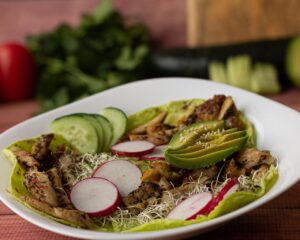
Welcome to the 4th Article of the Series: Wholesome Living – A Journey to Wellness!
Step into the fourth chapter of “Wholesome Living – A Journey to Wellness”! Your dedication to well-being fuels our journey, and I’m thrilled to guide you through this enriching experience.
Introduction
Welcome to the exhilarating world of boundless energy and vitality! Have you ever found yourself wondering how to sustain high energy levels while savoring the rich, aromatic flavors of Indian cuisine? Your quest ends here. This comprehensive guide is your passport to a life teeming with energy, enthusiasm, and exuberance.
The Basics of a High-Energy Diet
Fuel your day with the right ingredients! A high-energy diet is not merely a calorie-counting game. It’s an intricate balance of macronutrients—proteins, complex carbohydrates, and healthy fats—that work in concert to keep you energized and invigorated from dawn to dusk.
Complex Carbohydrates
Picture a slow-burning candle that illuminates your room for hours on end. That’s the role complex carbohydrates play in your body. Foods like oatmeal, brown rice, and whole-grain chapati release energy at a steady pace, ensuring you’re never running on empty. They are rich in fiber, which aids in digestion and keeps you full for longer periods.
Proteins
Flex those muscles and get ready to seize the day! Proteins are the building blocks of life, crucial for muscle repair, cellular function, and yes, sustained energy. Incorporate a variety of protein sources like dry fruits, nuts, pulses, and legumes to keep your energy meter consistently high. Protein shakes and smoothies can also be a quick and delicious way to meet your protein needs.
Fruits and Vegetables
An apple a day does more than just keep the doctor away; it wards off fatigue and sluggishness. Fruits like bananas, oranges, and berries, along with leafy greens like spinach and kale, are nature’s multivitamins. They are packed with antioxidants, vitamins, and minerals that combat energy-draining free radicals.
Dairy and Alternatives
Milk isn’t just for kids or strong bones; it’s a powerhouse of nutrients like calcium and vitamin D that also serve as quick energy boosters. Spice up your dairy intake with concoctions like milk mixed with chia seeds and honey or opt for dairy alternatives like almond or oat milk if you’re lactose intolerant.
Foods to Avoid
Bid farewell to energy vampires like sugary snacks, soda, and processed foods. These quick fixes provide a momentary high but are followed by an energy crash that leaves you feeling lethargic and drained.
Expert Opinions
Dr. Vinod K. Mishra
Dr. Vinod K. Mishra, a renowned gastroenterologist, emphasizes the importance of a balanced diet for sustained energy and overall well-being. View his scholarly lecture here.
Sadhguru
Spiritual leader Sadhguru advocates for a fruit-based diet that benefits not just individual health but also the environment. Explore his teachings in this video presentation.
Hansa Maa
Yoga guru Hansa Maa shares her personal energy-boosting diet plan, which focuses on Ayurvedic principles and is as gentle on the digestive system as it is flavorful. Watch her instructional video series here.
FAQs
Can Coffee Boost Stamina?
While coffee contains caffeine, which can provide a temporary increase in energy levels, it is not a sustainable source of energy. Excessive consumption can lead to energy crashes and may disrupt sleep patterns.
How Does Weight Loss Impact Energy Levels?
Weight loss can have varying effects on energy levels. Initially, one may experience fatigue due to caloric restriction, but over time, weight loss generally leads to increased energy and stamina.
Are Omega-3 Fatty Acids Good for Boosting Energy?
Omega-3 fatty acids, commonly found in fish and flaxseeds, have been shown to improve cognitive function and may contribute to sustained energy levels.
A High-Energy Indian Diet Plan for Women
Tailored for women aged 30-50. This plan aims to provide energy without exceeding the average maintenance calorie level for this age group, which is around 1800-2000 calories per day. Please note that the calorie counts are approximate values.
Breakfast:
- Poha: Approx. 250 calories
- Portion: 1 cup
- Energy Boost: Complex carbs for sustained energy.
Mid-Morning Snack:
- Fruit Salad: Approx. 150 calories
- Portion: 1 bowl
- Energy Boost: Natural sugars and fiber.
Lunch:
- Chana Masala: Approx. 300 calories
- Portion: 1 cup
- Energy Boost: Protein and fiber.
- Roti: Approx. 80 calories each (2 Rotis)
- Energy Boost: Complex carbs.
Afternoon Snack:
- Sprouted Moong Salad: Approx. 120 calories
- Portion: 1 bowl
- Energy Boost: Protein and fiber.
- Recipe: Sprouted Moong Salad Recipe
Dinner:
- Palak Sabzi: Approx. 200 calories
- Portion: 1 cup
- Energy Boost: Iron and vitamins.
- Recipe: Palak Sabzi Recipe
- Roti: Approx. 80 calories each (2 Rotis)
- Energy Boost: Complex carbs.
Dessert:
- Rice Kheer: Approx. 250 calories
- Portion: 1 small bowl
- Energy Boost: Quick carbs and milk proteins.
Total Calories: Approx. 1610
Please note that the provided meal plan samples are approximate in terms of calories, and individual needs may vary. Adjust portion sizes and food choices to meet your specific requirements and preferences while staying within the recommended caloric range. If you have any underlying health conditions or specific dietary needs, consider consulting a healthcare professional or registered dietitian before making significant changes to your diet.
Conclusion
What an enlightening journey this has been! We’ve delved into the essence of a high-energy diet, explored expert opinions, and even crafted a specialized Indian diet plan to keep you buzzing with vitality. But remember, achieving a resilient immune system and boundless energy is not just about what you eat; it’s about how you live your life.
As you continue on this path of self-improvement, always keep in mind: “Fitness is not about being better than someone else. It’s about being better than you used to be.”
So, are you ready for what’s next? Hold onto your seats because the next installment in our “Wholesome Living – A Journey to Wellness!” series promises to be a game-changer! We’ll be diving deep into the world of “Nutrient-Focused PCOS Management Diet.” Discover how you can manage PCOS through nutrient-focused choices, all while enjoying the flavors you love.

© 2023 Tanushree Jain
